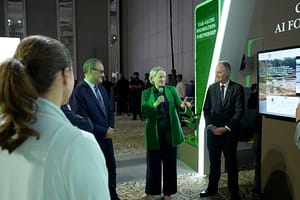I am just back from the 12th Meeting of the Conference of the Contracting Parties to the Ramsar Convention on Wetlands (COP12) in, Uruguay (http://www.ramsar.org/about/cop12-punta-del-este-uruguay-1-9-june-2015). It was great to connect with many familiar faces who had attended wetlandsforum.net events. Paul Ouédraogo and Dede Amah of the Africa Ramsar secretariat , were showing their usual energy in supporting the cause of African wetlands.
The theme of COP 12 is Wetlands for our Future. Plenary presentations of the first day left little doubt of the crisis facing the worlds wetlands, with 40% of wetland habitats being lost over the last 40 years. Inger Andersen, Director General of the International Union for Conservation of Nature (IUCN), referred to the “relentless pressure on wetlands”, calling it aa wakening call for action and “if this were a business the stakeholders would not stand for it” as we over draw nature’s credit.
The Ramsar COP is not only a formal meeting to agree matters of business for the next three years and beyond, and where the discuss a series of draft resolutions . It is also an opportunity to showcase new initiatives and open up discussion s across a varied range of wetland topics. In one of these “side-events”, the Ramsar Regional Centre for East Africa (RAMCEA) co-hosted an event on Synergies and Lesson Learnt with Centres from the Western Hemisphere and East Asia. All the centres face similar challenges in keeping a continuity of support for their activities, and where best to focus their work. Ramcea has just started a project led by BirdLife international on the protection of critical wetlands in the Lake Victoria Basin, and will be involved in disseminating outputs for the project over the next two years.
Against the backdrop of the ongoing loss of wetlands, there are also success stories. One of the Ramsar Wetland Conservation Awards for 2015, through the support of the food company Danone went to the NGO Océanium, represented by Jean-Christophe Henry, of Senegal for work on the restoration of mangroves (see presentation of award by Secretary General of Ramsar: http://www.iisd.ca/ramsar/cop12/images/3jun/IMG_1826.jpg). Through gaining carbon credits, the restoration of mangroves makes good business as well as ecological sense. Jean-Christophe Henry later explained to me that the scheme started to support the livelihoods of rice farmers who were losing their land to salinization because the buffer of the coastal mangroves were disappearing. More information on the mangrove restoration of Senegal can be found at http://www.livelihoods.eu/portfolio/oceanium-senegal/.
An event towards the end of my visit to the COP, and which struck a chord with me, was the side event on Celebrating Wetland Cultures on the World. Ramsar has recently launched The Ramsar Culture, Livelihoods & Wetlands Partnership, and The Ramsar Culture Network. The Partnership is supported by the MAVA Foundation, thinking wetland cultural and natural heritage. I am sure that wetlandsforum.net has a rich knowledge of wetlands and their cultural link in Africa, and I invite you to send us your contributions, to share with each other, and the world.
Further information on the Ramsar Cultural initiatives can be found at http://www.ramsar.org/activity/culture-and-wetlands.



 Women in Mandla, Madhya Pradesh are becoming leaders of their homestead farms.
Women in Mandla, Madhya Pradesh are becoming leaders of their homestead farms. Mark Smith, IWMI's director general shares insights on how governments can plan and implement policies to manage future water risks in food systems.
Mark Smith, IWMI's director general shares insights on how governments can plan and implement policies to manage future water risks in food systems. Alok Sikka and Giriraj Amarnath reflect on how, through partnerships with institutions like IWMI, Bharat-VISTAAR can evolve from a data platform into a decision-ready public good.
Alok Sikka and Giriraj Amarnath reflect on how, through partnerships with institutions like IWMI, Bharat-VISTAAR can evolve from a data platform into a decision-ready public good. IWMI's Muhammad Ashraf shares expert insight on sustainable groundwater management to address Balochistan's water crisis.
IWMI's Muhammad Ashraf shares expert insight on sustainable groundwater management to address Balochistan's water crisis. Through CGIAR’s AI Hub, IWMI researchers lend expertise to a global push to apply AI in agriculture and water resilience.
Through CGIAR’s AI Hub, IWMI researchers lend expertise to a global push to apply AI in agriculture and water resilience.